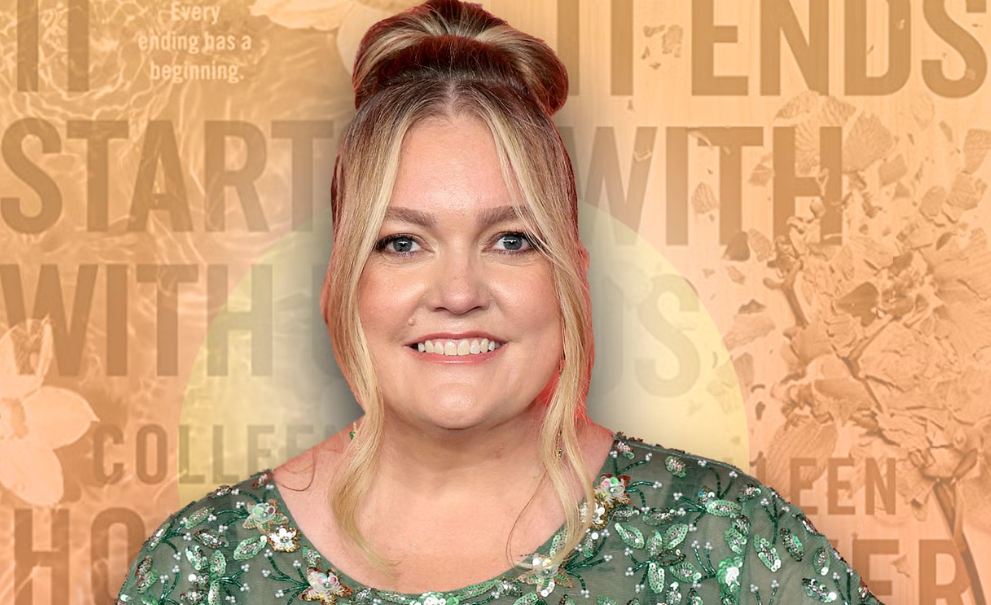From Texas social worker to multiplatform phenomenon
Colleen Hoover’s journey is remarkable. Born December 11, 1979 in Sulphur Springs, Texas, Hoover originally pursued a career in social work before turning to fiction writing. She self-published her debut novel, Slammed, and built faithful readers via word-of-mouth and social-media momentum — long before TikTok would amplify her breakout.
Her career pivoted when It Ends With Us became a cultural moment: a deeply emotional romance dealing with abuse, resilience and complex relationships. It resonated with millions of readers and later attracted Hollywood interest.
Today Hoover has authored over 20 novels, sold well in excess of 20 million copies globally, and has seen multiple titles licenced for film or television adaptation. Honey+1
Financial trajectory & business model
Hoover’s financial success underscores how modern authors can transform into diversified brands:
-
Net worth: Independent estimates place Hoover’s net worth between US$7 million and US$10 million in January 2025. Some earlier or more optimistic sources suggest up to US$12 million. Urban Splatter
-
Book sales & royalties: For traditionally published titles, she reportedly earns between 8 %–15 % of the retail price. For self-published work, her royalty percentages can be much higher, significantly boosting margins.
-
Adaptation rights & merchandising: The film version of It Ends With Us (2024) elevated her brand dramatically. While exact terms are private, adaptation deals typically include a lump-sum plus backend participation. One tracking site notes the film helped push her to seven-figure earnings.
-
Additional revenue streams: Hoover also derives income from themed merchandise, special editions, foreign-rights sales and brand collaborations — an author-entrepreneur model rather than a pure writer’s model.
As a result, her business model aligns with that of a creative-content CEO: capturing intellectual property (her novels), monetising via multiple verticals (print, digital, film/TV, merchandise), and leveraging an engaged fan base (notably via Instagram, TikTok and direct-to-consumer offers).
Legal-drama meets brand management: The adaptation storm
What truly elevates Hoover’s story from literary success to board-room intrigue is the complex legal and financial drama surrounding the film adaptation of It Ends With Us.
The film’s directing star, Justin Baldoni, and lead actress, Blake Lively, are engaged in a high-profile dispute involving accusations of sexual-harassment, defamation and creative control. Within this, Colleen Hoover herself has been deposed as a witness.
As this plays out, the potential financial impact on Hoover’s brand and future earnings is significant. If the adaptation machine slows or reputational damage occurs, downstream revenues (sequels, spin-offs, foreign licensing) could be threatened. As one entertainment-industry analyst puts it, “An author’s IP is only as safe as the story of its motion-picture business remains untarnished.”
Latest developments: brand, risk and opportunity
-
In February 2025 Hoover re-activated her Instagram after a hiatus, but notably removed photos of Blake Lively and Justin Baldoni — signalling how closely her author-brand is tied to the film’s public narrative.
-
In March 2025 she quipped she was “broke as s-t” after discounting her merchandise, a candid moment that highlights both the volatility of author-brand income and the ongoing ripple effects of the legal drama around the adaptation.
-
The new film adaptation Regretting You (based on her novel) released October 2025, to disappointing critical reaction — raising questions about the sustainability of the current “Hoover adaptation boom.” Forbes
Strategic lessons for creator-CEOs and brand stewards
According to analysis reviewed by CEO Today, Hoover’s situation provides instructive take-aways for any creator, CEO or brand steward operating in the 21st-century content economy:
1. Intellectual property as strategic asset
Hoover didn’t just write books — she built a portfolio of IP that translates across media. Her novels are the “minimum viable product,” with film rights, merchandising and direct-to-fan offers layered on top. This stacking of revenue streams is a hallmark of creative-enterprise strategy.
2. Brand risk & reputational exposure
The ongoing lawsuit around It Ends With Us demonstrates that an author’s brand can be vulnerable to third-party legal disputes. Hoover’s name is now collateral in a Hollywood battle; the reputational and financial stakes extend beyond her own pages to the boardrooms of film studios, PR firms and legal defence teams.
As noted by legal commentator Jane M. Smith at the American Bar Association:
“When creative-IP becomes entangled in litigation, the ripple effects for all licence-holders — authors, producers, distributors — can be unpredictable and costly.”
3. Revenue volatility and diversification
Despite the multi-million-dollar net worth figure, Hoover’s public claim of being “broke as s-t” after discounting merchandise underscores an important fact: creative income often rides peaks and troughs rather than smooth steady growth. Diversification of products and channels is key, but so is managing cash flow and risk-buffers when big bets (e.g., film adaptation) hang in limbo.
4. Strategic narrative control and social media
Hoover’s direct communication with fans (via Instagram, TikTok) is a strength. But as the public narrative around the film adaptation turned litigious, she had to make visible strategic adjustments (removing references to the film stars, adjusting merchandising). This reveals the need for creators to not just control content, but also the public brand narrative when external partners become potential liabilities.
What’s next: forecasting the next chapter
What lies ahead for Colleen Hoover? Here are key variables to watch:
-
Film/TV adaptation pipeline: The commercial success of future adaptations (beyond It Ends With Us) will determine whether her author-brand continues to scale or plateaus.
-
Legal resolution: The outcome of the Baldoni-Lively litigation (trial scheduled March 2026) may impact whether her IP keeps the carrier wave of goodwill and studio investment it currently rides. EW.com+1
-
New business ventures: Further branching into direct-to-consumer products, streaming deals or global foreign-rights could offset volatility. Hoover already has a dedicated fan base; monetising it outside traditional publishing is a growth lever.
-
Brand management: Maintaining engagement and trust with her audience, especially amid public drama, will be vital. Her transparency about finances and merchandising offers shows she understands the necessity of brand authenticity.
Final word
Colleen Hoover has transformed from Texas social-worker to literary-business CEO, amassing millions, selling tens of millions of books and riding the wave into Hollywood. But with great reach comes great risk: the legal entanglements around her film adaptation lay bare how a creator’s brand, finances and reputation can all become intertwined with external stakeholders. For readers, fans and brand-builders alike, Hoover’s story offers a live case study in how creative ambition must be married to strategic vision — and how even a US$10 million net-worth author must manage cash-flow, adaptation risk and public narrative as if running a modern content enterprise.














